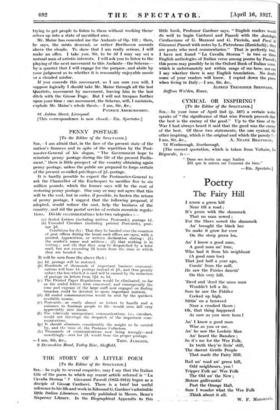PENNY POSTAGE [To the Editor of the SrEc.-rwron.] SIR, —I am
afraid that, in the face of the present state of the nation's finances and in spite of the repetition by the Post- master-General of his slogan, " The Government hope to reinstate penny postage during the life of the present Parlia- ment," there is little prospect of the country obtaining again penny postage, unless the public are prepared to forgo certain of the pre" sent so-called privileges of id. postage.
It is hardly possible to expect the Postmaster-General to ask the Chancellor of the Exchequer to sacrifice five to six million pounds, which the former says will be the cost of restoring penny postage. One may or may not agree that this will be the cost, but in order, if possible, to hasten the return of penny postage, I suggest that the following proposal, if adopted, would reduce the cost, help the business of the country, and rid the postal service of certain eccentric regula- tions. Divide communications into two categories
(a) Sealed Letters (including written Postcards), postage Id. (b) Unsealed Circulars (including printed Postcards), post- age id.
Conditions for (b) : That they be handed over the counters of post offices during the hours such offices are open, with a printed, typewritten, or written declaration stating : (1) the sender's name and address ; (2) that nothing is in writing ; and (3) that they may he despatched by a later mail, but not exceeding 24 hours from the time at which they are handed in.
It will be seen from the above that :
(a) Id. postage will be restored.
(b) Hundreds of thousands of important business cominuni- - cations will bear Id. postage instead of id. and thus greatly reduce the loss which it is said will be caused by the reduction
of postage on letters from lid. to Id.
(e) The Printed Paper Regulations would be eliminated, so far as the sealed letters were concerned, and consequently the time and expense of the large staff now engaged on finding breaches could be devoted to more important matters.
(d) All sealed communications would be sent by the quickest available means.
(e) Postcards—as costly almost as letters to handle and a nuisance to business people to file—would soon fall very appreciably into disuse.
(f) The relatively unimportant communications, i.c., circulars, would not interrupt the despatch of the important com- munications.
(g) It should eliminate considerably the weight to be carried by, and the time of, the Postmen Collectors.
(II) Thousands of communications now being wrongly—and unwittingly—sent for id. would bear the proper postage.
—I am, Sir, &e., Tnos. JA3IESON.
ti Devonshire Road, Tolley Rise, Sheffield.


































 Previous page
Previous page